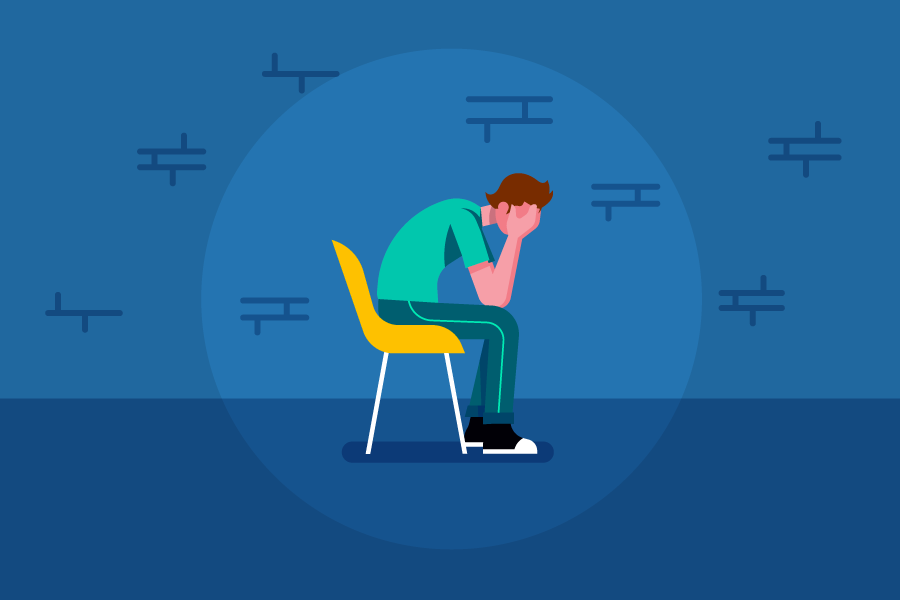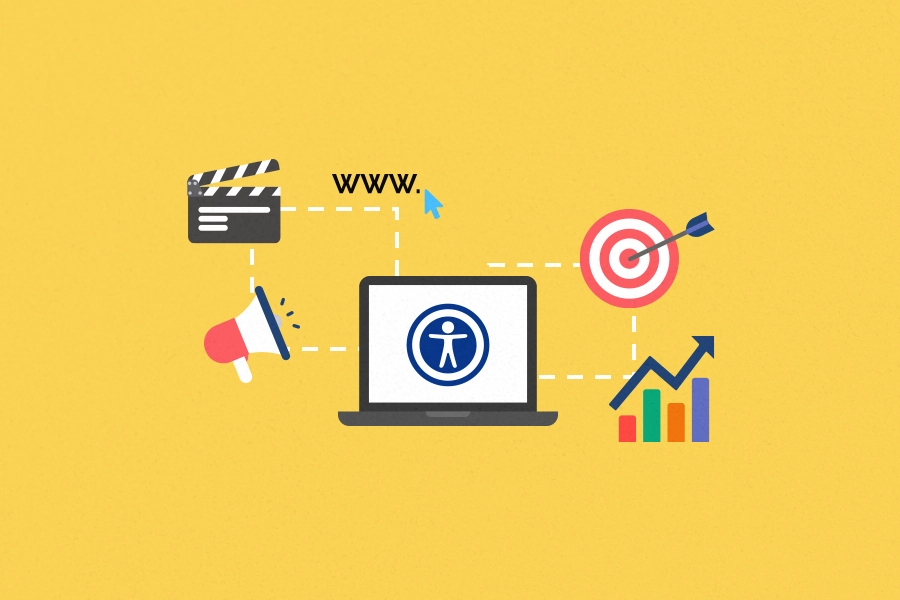
Ableism: what is it, examples, consequences and how to fight it

Ableism may be the concept you are least familiar with regarding the discrimination of minority groups. Characterized as social, ethnic, gender or other segments that, regardless of quantity, possess little political, social and economic representation. They are also called minorities and minority groups.
Sexism in regards to women, racism against black people, and homophobia, transphobia and other forms of gender discrimination towards the LGBTQIA+ community, are concepts that are already largely debated nationwide and that have came to prominence in the past years. This is due thanks to events of national reach and entertainment TV shows that mobilize the audience with these issues.
What is ableism?
The word “ableism” means the discrimination of people with disabilities. The term is based on the social construct of a standard body type, without any disabilities, known as “normal”, and on the underestimation of people’s ability and aptitude in virtue of their disabilities.
Ableism is considered a form of prejudice, usually coming from people without disabilities, that prejudge the abilities of people with disabilities based solely on what they believe about that condition.
Many people do not have any knowledge of ableism due to the lack of popular debate. Little is discussed nowadays about the non-compliance of the legislation that ensures the right and full participation of the person with disabilities in society. This behavior only aggravates this form of prejudice, since it is a way of perpetuating the belief that people with disabilities are not capable of actively participating in society, which is a huge misconception.
Veiled ableism happens when many people refer to people with disabilities with a kind of “heroic perception”. In other words, an overvaluation of performing basic tasks, for instance. This happens because of the depth of structural and unconscious discrimination based on disabilities.
What is an ableist person?
Ableist is how people with limiting beliefs regarding people with disabilities are called. They judge others in such a way that they exclude them from society. Be it in a conversation group or even in the workplace.
Are also considered ableists those people that “joke around” pointing out disabilities. Or even those sentences that refer to people without disabilities, but using a disability in a demeaning way. We will talk more about some ableist expressions further along this text.
What is ableism in the United States?
In the United States, there is legislation that ensures people with disabilities’ rights and their inclusion in society. It is called ADA (Americans with Disabilities Act), that prohibits discrimination against people with disabilities, also ensuring their inclusion in all means. It also serves as a guideline for private and public corporations to follow and guarantee accessibility and integration into the economic, political, cultural and educational mainstream of American society.
With the proper accessibility resources in place, most of the time people with disabilities can carry out their activities with autonomy and independence. This promotes their full participation in society, education and workplace included.
When these regulations are not respected in our country, either because of negligence or bad faith, we can also consider it as a form of ableism.
What are the different forms of ableism?
There are three forms of ableism:
Medical ableism:
Many people mistakenly refer to people with disabilities as if they had a disease. This is called medical ableism.
Recreational ableism:
This term is used to define the most common type of ableism in society. It refers to those bad jokes involving disabilities.
Institutional ableism:
This kind of ableism happens when organizations hire the bare minimum of employees with disabilities and do not treat them with equity in relation to their peers without disabilities. This is also noticed in the lack of accessibility in those places.
Examples of ableist sentences
Many people, even due to lack of knowledge, end up behaving and reproducing ableist sentences. This is why it is so important to seek information. This way we can make a difference and break this prejudice loop. So here are some examples of ableist sentences to take off of your vocabulary:
- “Cripplingly/crippled by/a crippling degree of…”
- “You are acting bipolar”
- “What a schizo”
- “I am so (insert disability here)”
- “Fall on deaf ears”
- “Turn a blind eye”
- “You don’t look disabled”
- “Confined to a wheelchair”
- “Being handicapped”
- “I thought you were normal, you don’t look deaf”
- “Tone deaf”
- “You don’t seem deaf, you can even talk”
- “Stop being so retarded”
- “Are you blind?”
- “Doesn’t your problem have a cure?”
- “Even though you have a disability, you seem happy”
- “I wonder if your children will be born normal”
- “But how can you do things with this disability?”
- “Blind spot”
What are the consequences of ableism?
One of the main consequences of excluding people with disabilities is that this puts them in vulnerable situations, since they don’t get the same education and work opportunities. Without even mentioning the emotional and psychological damages, since by being diminished, they do not feel like they belong. Many of them end up having to deal with these feelings by themselves, due to lack of acceptance and understanding from other people that don’t actually experience this.
Is ableism a crime?
Yes, and it is also considered a federal hate crime! The Matthew Shepard and James Byrd Jr. Hate Crimes Prevention Act, alongside with the ADA, ensures people with disabilities’ rights, and respect is one of them! This is why discriminatory attitudes against people with disabilities can and should be punished by law.
How to avoid ableism?
Referring to a person’s disability to diminish or turn them into a hero is ableism. Therefore, treating people with disabilities with equity and respect is to contribute to a non-ableist society. However, there are some key points that we must pay attention to and take into consideration:
Mind your attitudes
To avoid ableism, it is necessary to mind ableist attitudes from others around us and ourselves. Underestimating people with disabilities, not believing in their ability to perform activities, is an ableist attitude. The same happens with their overvaluation when they carry out a common daily activity with autonomy.
It is fundamental to always seek information, consume contents produced by people with disabilities and learn with those who live with it daily. Aside from this, we have previously listed some words and expressions that are rooted in our society’s vocabulary and that must be extinct from it.
Inclusion is law
Many people don’t know, but social inclusion is covered by the Americans with Disabilities Act (ADA). It is a set of guidelines that aim to ensure people with disabilities’ rights, promoting inclusion and proper citizenship to them.
Value diversity
All people are unique, and that is a good thing! Diversity amongst people is what enriches and colors the world. This is what makes us grow and learn from each other. Therefore, plurality, that is, what makes us “different” from each other, should never be considered a flaw. The more diverse people, the better we all are in every sense. For example: at work, the more different people there are, the more creative we will have. Involving people with disabilities in company procedures is also essential, since they have a voice and must decide for what they want.
How to fight ableism
Aside from our daily attitudes of always being respectful, there are also other ways to fight ableism, such as:
Generate knowledge on the subject
One of the first steps to act against ableism is to know about its existence. As we have mentioned at the beginning of the text, many people have never even had contact with the subject. Therefore, the first step is to inform and promote educational content on ableism and its impacts in society and in the workplace. You can do this through the use of booklets, lectures, dynamics, videos and speeches.
Encourage the creation of groups
Creating and encouraging spaces for sharing experiences between people with disabilities and other employees, that wish to understand and support the group, is an initiative that contributes to building a sense of belonging between participants. It also works as a trust network to strengthen these professionals against ableist logic.
With attitudes such as this one we will be capable of building organizations that are increasingly accessible and inclusive for professional diversity, in such a way that we can potentialize and value all human resources.
Empower the leadership
An important attitude to end underestimation of people with disabilities’ professional abilities is through training regarding unconscious bias focused on disabilities, accessibility and inclusive language to all leaders, even those that do not have any employees with disabilities on their teams. Another interesting alternative is to build sensory experiences to stimulate that more people practice empathy.
Conclusion
Ableism is a form of discrimination against people with disabilities. Unfortunately, it is very much rooted in society’s vocabulary and actions. To beat it, we must all do our part. It all begins with a good dose of information and attention to our attitudes.
If you want to create an anti-ableist world, start transforming the spaces you already belong to and be the change you want to see in the world!


